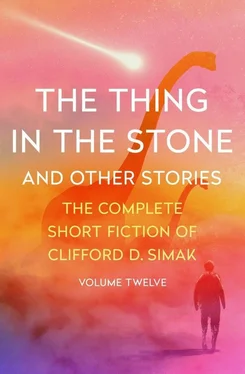“They’re gone!” shrieked Mrs. Templefinger. “My jewels are gone!”
The butler padded forward silently.
“Perhaps I should call the police, madam,” he offered respectfully.
A strange light came over Mrs. Templefinger’s face, a soft and human light that smoothed out the lines around her eyes and suddenly made her soft and gracious instead of a glowering old dowager. For the first time in twenty years, Mrs. Templefinger smiled a gracious smile.
“No, Jacques,” she whispered. “Not the police.”
Still smiling, she sat down again, nodded to the violinist. The chain fell from her fingers, almost as if she had forgotten the jewels, almost as if a cool half million dollars’ worth of jewelry didn’t matter.
The violinist swept the bow across the strings again.
Cabot Bond rose and tiptoed softly from the room. Suddenly it had occurred to him there was something he must do—phone his editor, tell him to play down any more stories the wires might carry on the Rosetta scroll of Mars.
Harrison Kemp, head of the Solar Research Bureau on Pluto, straightened from the microscope, expelling his breath slowly.
His voice was husky with excitement. “Johnny, I really believe you’ve got it! After all these years … after—”
He stopped and stared, a stricken stare.
For Johnny Gardner had not heard him. Was not even looking at him. The man sat hunched on his stool, faint starlight from the laboratory port falling across his face, a face that had suddenly relaxed, hung loose and slack, a tired, wan face with haggard eyes and drooping jowls.
Kemp tried to speak, but his lips were dry and his tongue thick and terror dried up his words before they came. From somewhere back of him came the slow drip-drip of precious water. Outside, the black spires of Plutonian granite speared up into the inky, starry sky.
And before the port, the hunched figure of a man whose gaze went out into the alien wilderness, yet did not see the jumbled tangle that was Pluto’s surface.
“Johnny!” Kemp whispered, and the whisper frightened him as it seemed to scamper like a frightened rat around the room.
Gardner did not answer, did not move. One hand lay loosely in his lap, the other dangled at his side. One foot slipped off the rung of the stool and, just failing to reach the floor, swung slowly to and fro like a ghastly pendulum.
Kemp took a step forward, reaching out a hand that stopped short of Gardner’s shoulder.
There was no use, he knew, of trying to do anything. Johnny Gardner was gone. The hulking body still sat on the stool, but the mind, that keen, clear-cut, knifelike mind, was gone. Gone like a dusty mummy falling in upon itself. One moment a mind that could probe to the very depth of life itself—the next moment a mind that was no more than a darkening cavern filled with the hollow hooting of already half-forgotten knowledge.
Fumbling in the darkness, Kemp found another stool, perched wearily on it. Perched and stared at Gardner, while he felt the nameless horror of an alien planet and an alien happening slowly circle over him, like dark wings beating in the starlight.
A small cone of brilliance hung above the workbench, lighting up the electronic microscope. And under the microscope, Kemp knew, was something that came close to being the raw material, the constituent element of life. Something that he and Johnny Gardner and Victor Findlay had sought—for how many years? To Kemp, sitting there in the darkness, it seemed eternity.
An eternity of research, of compiling notes, of seeming triumph, always followed by the blackest of defeat.
“And,” said Harrison Kemp, speaking to himself and the silent room and the madman at the port, “here we are again!”
It would be futile, Kemp knew, to try to pick up where Gardner had left off. For Gardner had worked swiftly, had been forced to work swiftly, in those last few minutes. Since there had been no time to jot it down, he had tucked away that final crucial data in his brain. Even under the near-zero conditions to which the protoplasmic molecules had been subjected, they still would be unstable. They would have changed now, would have been rendered useless for further observation—would either have become more complex life or no life at all, having lost that tiny spark that set them off from other molecules.
Kemp knew he and Findlay would have to start over again. Johnny’s notes would help them to a certain point—up to that point where he had ceased to write them down, had stored them in his brain. From that point onward they would have to go alone, have to feel their way along the path Johnny Gardner had taken, try to duplicate what he had done. For whatever was in Johnny’s brain was lost now—lost completely, gone like a whiff of rocket gas hurled into the maw of space.
A door creaked open and Kemp got to his feet, turning slowly to face the man silhouetted against the light from the room beyond.
“Why so quiet?” asked Findlay. “What are you fellows—”
His voice ran down and stopped. He stood rigidly, staring at the star-lighted face of Johnny Gardner.
“It just happened, Vic,” said Kemp. “He called me to show me something in the ’scope and while I looked it happened to him. When I looked up again and spoke to him, he was sitting there, just like he is now. He was all right before, just a few seconds before.”
“It hits them like that,” said Findlay. He stepped into the room, walked close to Kemp. “We should know,” he said. “We’ve seen it happen to enough of them, you and I. Sometimes I have a dream, with you and me the only sane men left in the entire System. Everybody cracking, leaving just the two of us.”
“I should have taken your advice,” Kemp declared bitterly. “I should have sent him back on the last ship. But he looked all right. He acted O.K. And we needed him. He hung out for a long time. I thought maybe he would last.”
“Don’t blame yourself, chief,” said Findlay. “There was no way for you to know.”
“But you knew, Vic! You warned me. You said he’d crack. How did you know? Tell me, how did—”
“Take it easy,” cautioned Findlay. “I didn’t know. Nothing definite, at least. Just a feeling I had. A hunch, I guess you’d call it.”
They stood together, shoulder to shoulder, as if by standing thus they might beat back the sense of doom, the air of utter human futility that seemed to well within themselves.
“It won’t always be like this,” said Kemp. “Some day we’ll be able to keep men’s minds from going haywire. We’ll find a way to help the mind keep pace with man’s ambitions, to fall in step with progress.”
Findlay nodded toward Gardner. “He was on the right track. He took the first long step. Before we even try to study the mind as it should be studied, scientifically, we must know what life is. Before, we’ve always started in the middle and stumbled back, trying to find the Lord knows what. We can’t afford to do that any longer. We have to have a basis, a basic understanding of life to understand ourselves.”
Kemp nodded. “You’re right, Vic. He took the first long step. And now … now, he goes to Sanctuary.”
They helped Johnny Gardner from the stool and across the room. He walked like a blind man, stumblingly, muscles uncertain. His eyes stared straight ahead, as if he were watching something no one else could see.
“Thank heaven,” said Findlay, “he went this way. Not like Smith.”
Kemp shuddered, remembering. Smith had been violent. He had mouthed obscenities, had screamed and shouted, wrecked the laboratory. They had tried to calm him, to reason with him. When he charged Findlay with a steel bar, Kemp had shot him.
Although even that hadn’t been any worse than Lempke. Lempke had committed suicide by walking out of the dome into the almost nonexistent atmosphere of frigid Pluto without benefit of space gear.
Читать дальше












